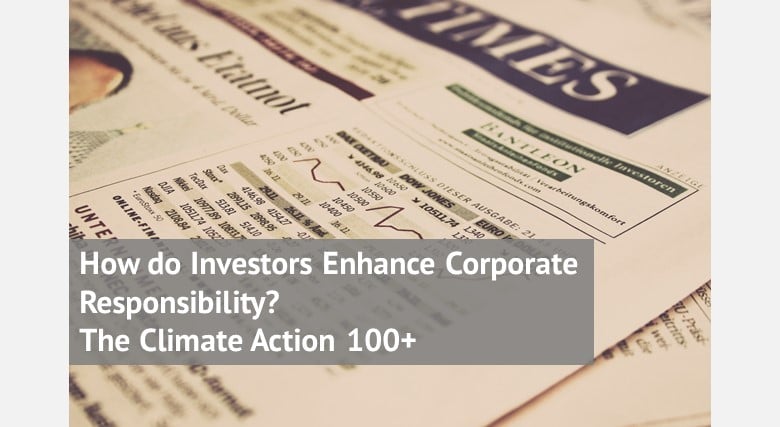Disclosure of extra financial information has become the new norm and organizations cannot longer provide any valid argument that would justify the non-alignment with the principles of Corporate Social Responsibility (CSR) and Sustainable Development. The importance of implementing the principles of CSR and Sustainable Development is not only crucial for organizations’ success and the society in general but also for investors whose interest in environmental, social and governance (ESG) factors has gone mainstream. Yet, investors have not only assumed an active role and are standing behind and evaluating which organizations are socially responsible and worth investing in but have also recently started to make the world’s largest corporate greenhouse gas emitters take necessary action on climate change.
What is Climate Action 100+?
Climate Action 100+ is an investor initiative to ensure the world’s largest corporate greenhouse gas emitters take necessary action on climate change. Following the Paris Agreement, that was signed in 2015, Climate Action 100+ was launched in December 2017 with the aim to “engage with the world’s largest corporate greenhouse gas emitters to curb emissions, strengthen climate-related financial disclosures and improve governance on climate change”. Climate Action 100+ was initiated by five partner organizations: The Asia Investor Group on Climate Change (AIGCC); Ceres; The Investor Group on Climate Change (IGCC); The Institutional Investors Group on Climate Change (IIGCC); and The Principles for Responsible Investment (PRI) and as of June 2019, 320 investors participate in the initiative. The initiative not only focuses on operational emissions of companies but also on the emissions created across their value chain: ‘‘investors will be looking at how companies can efficiently address and disclose how they manage climate risk and direct and indirect scope 1, 2, and 3 emissions across their value chain’’. When it comes to the selection of companies involved, an initial list of 100 focus companies was identified and these were selected from a major global index (MSCI ACWI) that represents 85% of global investable equity and an additional list of 61 companies (known as the “+” list) was added to the focus list of companies. These late comers had ‘‘either a significant opportunity to drive the clean energy transition at the global or region level or may be exposed to climate-related financial risks, including risks to physical assets, that are not captured solely by emissions data’’. What the boards and senior management of these companies are asked by the investors to meet the following requirements:
1) Implement a strong governance framework which clearly articulates the board’s accountability and oversight of climate change risks and opportunities;
2) Take action to reduce greenhouse gas emissions across the value chain, consistent with the Paris Agreement’s goal of limiting global average temperature increase to well below 2 degrees Celsius above pre-industrial level;
3) Provide enhanced corporate disclosure in line with the final recommendations of the Task Force on Climate-related Financial Disclosures (TCFD) and, when applicable, in line with sector-specific Investor Expectations on Climate Change according to the Global Investor Coalition on Climate Change, to enable investors to assess the robustness of companies’ business plans against a range of climate scenarios, including well below 2-degrees Celsius, and improve investment decision-making.
Climate Action 100+ accomplishments
Even though the Climate Action 100+ initiative has been in existence only for two years, it has achieved quite a lot:
- An agreement with Shell to reduce Scope 3 emissions intensity with actual targets plus leadership on US methane regulation;
- A management-backed resolution at British Petroleum (BP) to align business strategy with Paris goals which didn’t include Scope 3;
- A promise by Glencore to cap coal production (but not necessarily to halt investment in new projects);
- An unusually assertive letter from EU investors to EU energy utility companies requesting transition plans.
Can investors really make a difference in incorporating ESG in corporate decision making?
Even though companies are considering social and environmental responsible requirements and have made a progress in adopting sustainability and sustainable development principles, the progress made so far is still modest. Investor led initiatives like the Climate Action 100+ demonstrate the significant momentum towards building sustainable organisations and pushing companies to pursue strategies that incorporate ESG factors in their decision making processes and operations. This initiative coming from investors can be a game changer in highlighting climate action, since its reliance on funding companies can trigger more urgent and adequate response from the business world. It still remains to be seen if it will make a considerable difference in the current state of play in the area of sustainable development. But with USD12 trillion in Sustainable, Responsible and Impact (SRI) assets, corresponding to 26% of the total USD$46.6 trillion professionally managed assets at year-end 2017, there is evidence that investors can influence strategic decisions, push companies to better manage climate risks and generate sustainable, long-term returns.
Photo by Markus Spiske on Unsplash

